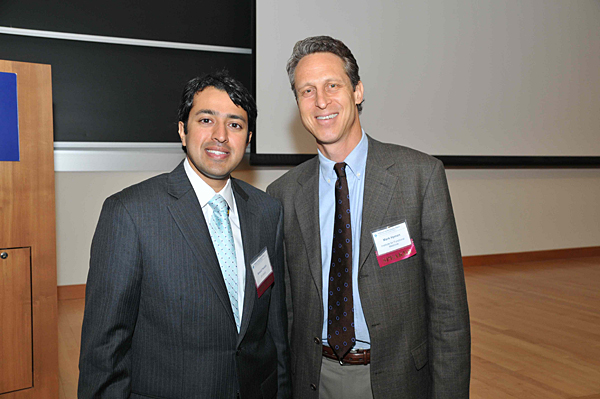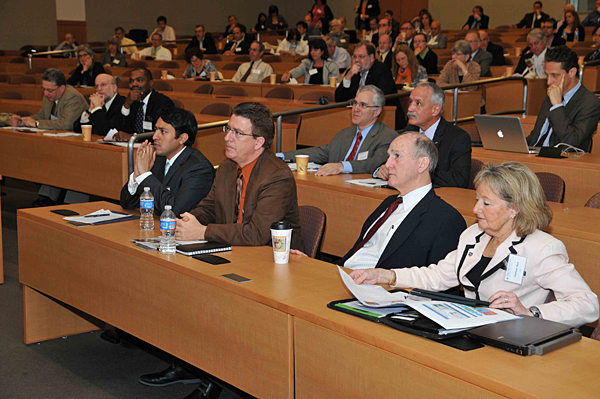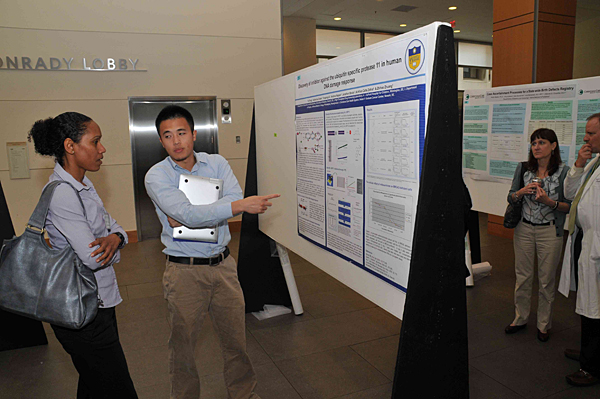


Approaches to chronic disease
Third annual DHSA Research Symposium features talks by two national experts
11:53 a.m., June 10, 2011--More than 230 participants attended the third annual Delaware Health Sciences Alliance (DHSA) Research Symposium at the Dorrance Hamilton Building on the Thomas Jefferson University campus on May 17.
The symposium was held to showcase existing joint programs among the DHSA institutions and to explore new opportunities to enhance translational research collaborations.
Research Stories
Chronic wounds
Prof. Heck's legacy
The event featured a panel on DHSA-related issues, reports on current and future DHSA pilot grants and individual breakout sessions aimed at enhancing translational research across the partner institutions.
In addition, research teams displayed 42 posters covering a broad range of health-related topics from cerebral palsy and cancer to tissue engineering and data warehousing.
Keynotes
Two national experts -- Anand Parekh, deputy assistant secretary for health at the U.S. Department of Health and Human Services (HHS), and Mark Hyman, chairman of the board of directors of the Institute for Functional Medicine in Lenox, Mass. -- delivered talks advocating new approaches to preventing and treating chronic disease.
Parekh addressed the role of comorbidity in the research enterprise. He noted that living with chronic disease increasingly means living with multiple chronic conditions (MCC) -- which is the case for more than one in four Americans.
“Despite this problem’s increasing trajectory, the healthcare system largely has continued to employ outmoded, 'siloed' approaches that focus on individual chronic diseases,” he said. “If we want to improve health outcomes and quality of life for people with chronic disease, we need to adopt new approaches, including use of the MCC paradigm.”
Parekh cited four HHS goals integral to this paradigm:
- Foster healthcare and public health system changes;
- Maximize the use of proven self-care management and other services;
- Provide better tools and information to healthcare, public health and social services workers; and
- Facilitate research to fill knowledge gaps.
Hyman advocated replacing our current disease-based paradigm with functional medicine, a patient-centered healthcare approach that addresses the unique interactions among genetic, environmental and lifestyle factors.
“To reverse the tsunami of disease and cost burden,” he said, “we need new disruptive, innovative delivery models that will enable sustainable lifestyle changes.”
Hyman pointed out that our current approach to chronic disease does not work, as evidenced by the fact that life expectancy is on the decline and the incidence of lifestyle-related illness is increasing.
“The future of medicine is functional medicine,” he said. “We need to focus on whole systems and balance by removing what causes imbalance and providing what creates balance.”
Medicine in the 21st century, according to Hyman, should consider
- How genes are translated into our health and disease patterns (emergence);
- How internal metabolic factors and environment influence gene expression (exposome);
- How our environment shapes our structure and function (epigenetics);
- How nutrients and phytochemicals speak to our genes (nutrigenomics); and
- How social networks influence health and disease (socionomics).
“We are moving from a static view of biology to that of dynamic system biology,” Hyman added.
About DHSA
The Delaware Health Sciences Alliance was established in 2009 with four founding partners—Christiana Care Health System, Nemours/Alfred I. duPont Hospital for Children, Thomas Jefferson University and the University of Delaware.
The alliance enables partner organizations to collaborate and conduct cutting-edge biomedical research, to improve the health of Delawareans through access to services in the state and region, and to educate the next generation of healthcare professionals.
DHSA’s unique, broad-based partnership focuses on establishing innovative collaborations among experts in medical education and practice, health economics and policy, population sciences, public health, and biomedical sciences and engineering.
Article by Diane Kukich
Photos courtesy of David Super, Medical Media Services, Philadelphia










